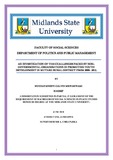Please use this identifier to cite or link to this item:
https://cris.library.msu.ac.zw//handle/11408/3630| Title: | An investigation of the challenges faced by non- governmental organisations in promoting youth development in Mutare rural district from 2008- 2012 | Authors: | Mkwakwami, Muchafangeyi Calvin | Keywords: | Youth development Non-governmental organisations Zimbabwe |
Issue Date: | 2018 | Publisher: | Midlands State University | Abstract: | The research investigated the challenges faced by NGOs in promoting youth development using the case study of Mutare Rural District in Zimbabwe. A developing country like that of Zimbabwe,past decades have revealed an extreme expansion in the growth of Non-governmental organisational sector both in social, economic and political spheres. NGOs are non-profit and humanitarian aid agencies that are devoted to the uplifting of lives of the poor, underprivileged, marginalized and underdeveloped areas. These areas of concern have captured the attention of both peace and development practitioners in many communities. Both community and national development reveals the provision of service delivery to enhance the lives of the people in terms of education, health and employment.NGOs have successfullyfilled in the gap that the government is failing to fill due to the social, economic and political problems that are in Zimbabwe.The significance of this research study was to analyse the challenges faced by NGOs in promoting youth development in Mutare Rural District of Zimbabwe.These challenges include relationship between state of Zimbabwe and NGOs, political intervention in NGOs operations, weak career development and decision making, economic instability (liquidity crunch), lack of innovation of NGOs and sustainability of non-governmental organisations programmes. The research hypothesized, NGOs as an integral part of civil society are facing challenges in their bid to foster youth development. The research looked at the challenges faced by NGOs in the implementation of youth orientated projects that promotes development,proffering recommendations to rectify the implementation processes in rural areas of Mutare and interventions needed to support youth developmental ventures. This was conducted in order to support or refute the hypothesis.The study included the mixed research methods approach where both qualitative and quantitative techniques were used in the presentation and analysis of data. Pre-requisite data was collected with the use of document analysis and surveys. The data collected was analysed quantitatively using the Statistical Package for the Social Sciences (SPSS) and thematic analysis methods was also used in the study for data analysis.Graphs and tables were used in the presentation of the findings. Ethical considerations were also observed by the researcher in the study. It is in the researcher‟s strength to also proffer recommendations which were presented these include: the donors to also not to pull away from their commitments, to the youths in Mutare Rural District and other rural districts that they should be more vigilant in knowing what‟s more beneficial to be involved in politics and become victims of political violence or to become perpetrators of peace enforcers in promoting peace building, the Government of Zimbabwe to be more cordial with NGOs as they also are representatives of the country abroad and to rectify its policies that affect NGOs like the NGO Bill of 2004, POSA 2005 and NGA 2016. | URI: | http://hdl.handle.net/11408/3630 |
| Appears in Collections: | Bachelor of Science Peace Studies Honours Degree |
Files in This Item:
| File | Description | Size | Format | |
|---|---|---|---|---|
| FINALISED_CHAPTERS[1].pdf | Full Text | 934.84 kB | Adobe PDF |  View/Open |
Page view(s)
238
checked on Jan 28, 2026
Download(s)
100
checked on Jan 28, 2026
Google ScholarTM
Check
Items in MSUIR are protected by copyright, with all rights reserved, unless otherwise indicated.



